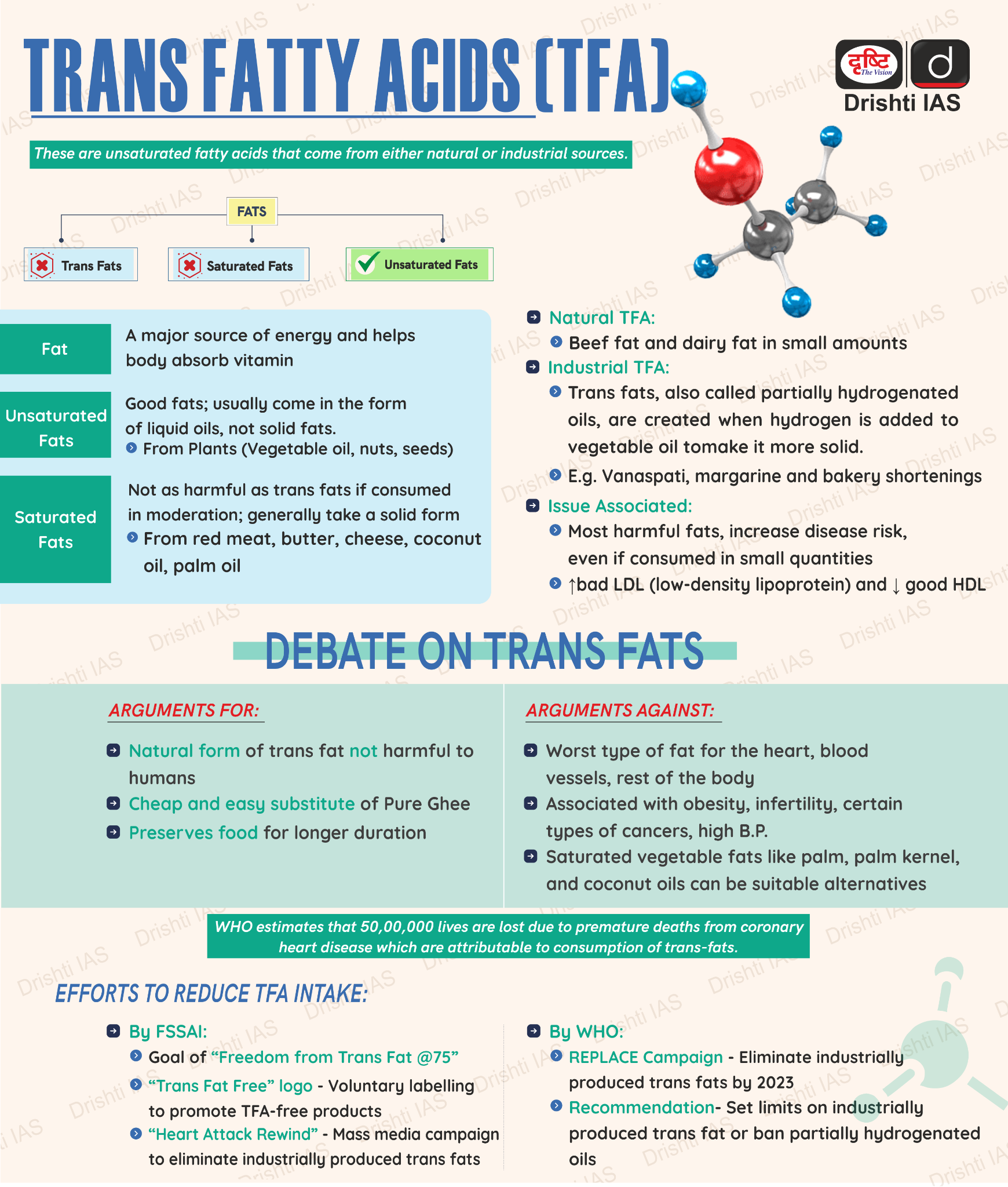Governance
Global Reports on Trans Fats and Insufficient Physical Activity
- 12 Jul 2024
- 6 min read
For Prelims: World Health Organization (WHO), Trans fats, Bad Cholesterol (LDL), Eat Right Movement, Heart Attack, Diabetes, Food Safety and Standards Authority of India (FSSAI), REPLACE
For Mains: Impacts of Trans Fat, Challenges in Eliminating Trans Fat, Initiatives to Eliminate Trans Fat.
Why in News?
Recently, the World Health Organization (WHO) has published the fifth milestone report on progress towards global trans fat elimination, covering the period from 2018–2023.
- In another development, a study was published in the Lancet Global Health journal that indicates almost 50% of adults in India engaged in insufficient levels of physical activity in 2022.
What are the Key Highlights of the WHO Report on Trans Fat?
- Industrially produced TFA is identified as a major contributor to heart disease. TFA offers no nutritional benefits and is detrimental to public health.
- In 2018, WHO set a target to eliminate TFA from the global food supply by the end of 2023. Even though the target has not been fully met, there has been remarkable progress made and sustained elimination would be achieved by 2025.
- By 2023, WHO's REPLACE action framework facilitated widespread adoption of best-practice policies in 53 countries, impacting 3.7 billion people, a substantial increase from 6% coverage five years earlier.
- WHO initiated a Validation Programme to recognise countries achieving TFA elimination goals. Denmark, Lithuania, Poland, Saudi Arabia, and Thailand were the first to receive the TFA Validation Certificate.
- WHO recommends all countries enact and enforce best-practice policies, engage in the Validation Programme, and encourage companies to reformulate products to eliminate TFA globally.
- Implementing best practice policies in just eight additional countries, (including Azerbaijan and China) would eliminate 90% of the global TFA burden.
What are the Highlights of the Lancet Paper on Insufficient Physical Activity?
- The definition of insufficient physical activity is not performing at least 150 minutes of moderate-intensity or 75 minutes of vigorous-intensity physical activity per week.
- Globally, about a third (31.3%) of adults were insufficiently physically active in 2022, up from 26.4% in 2010.
- South Asia ranks second highest globally in terms of insufficient physical activity among adults, following the high-income Asia Pacific region.in India, 57% of women were found to be insufficiently physically active, compared to 42% of men.
- Projections indicate that by 2030, 60% of Indian adults could be insufficiently active if current trends persist.
- Physical inactivity increases the risk of non-communicable diseases such as diabetes and heart disease. Rising physical inactivity, along with sedentary lifestyles, contributes to the increasing prevalence of these diseases and burdens healthcare systems.
Note
- A 2023 study by the Indian Council of Medical Research-India Diabetes (ICMR-INDIAB) estimated that in 2021, India had:
- 101 million people with diabetes.
- 315 million people with hypertension.
- 254 million people with obesity.
- 185 million people with high levels of LDL or 'bad' cholesterol.
Trans Fats
- Trans fats, or trans-fatty acids, are unsaturated fatty acids that come from either natural or industrial sources.
- Naturally occurring trans-fat comes from ruminants (cows and sheep).
- Industrially-produced trans-fat is formed in an industrial process that adds hydrogen to vegetable oil converting the liquid into a solid, resulting in “partially hydrogenated” oil .
India's Initiatives to Promote Healthy Lifestyle
What can be done to Ensure a Healthier Lifestyle among the Population?
- Check food labels for "partially hydrogenated oils" which indicate trans fats and choose healthy fats like olive oil, avocado, nuts, and fatty fish.
- Aim for at least 150 minutes of moderate-intensity exercise or 75 minutes of vigorous-intensity exercise per week as recommended by WHO. Break up sedentary time with short walks or stretches throughout the day.
- Encourage opportunities for women to participate in physical activity, like safe walking paths and women-only fitness classes. Promote the health benefits of exercise specifically for women.
- Raise awareness about the dangers of trans fats and the importance of physical activity through educational campaigns. Partner with schools, workplaces, and community centres to spread the message.
- Advocate for stronger government regulations to limit trans fats in processed foods. Support policies that promote physical activity like walkable neighbourhoods and public recreation facilities.
UPSC Civil Services Examination, Previous Year Question(PYQ)
Prelims:
Q. A company marketing food products advertises that its items do not contain trans-fats. What does this campaign signify to the customers? (2011)
- The food products are not made out of hydrogenated oils.
- The food products are not made out of animal fats/ oils.
- The oils used are not likely to damage the cardiovascular health of the consumers.
Which of the statements given above is/are correct?
(a) 1 only
(b) 2 and 3 only
(c) 1 and 3 only
(d) 1, 2 and 3
Ans: (c)







